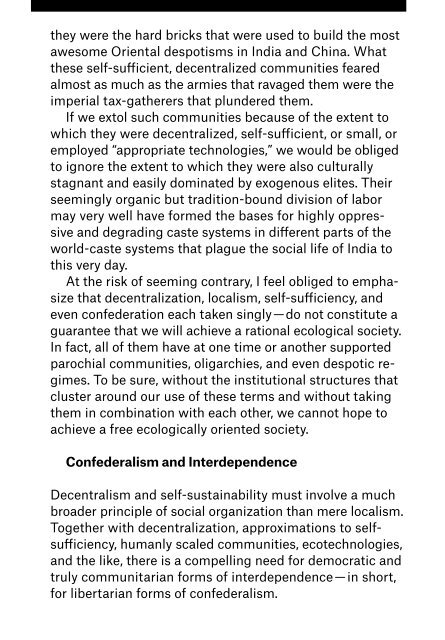Stateless Democracy
NWA5-Stateless-Democracy1.pdf?utm_content=buffer7beda&utm_medium=social&utm_source=twitter
NWA5-Stateless-Democracy1.pdf?utm_content=buffer7beda&utm_medium=social&utm_source=twitter
Create successful ePaper yourself
Turn your PDF publications into a flip-book with our unique Google optimized e-Paper software.
they were the hard bricks that were used to build the most<br />
awesome Oriental despotisms in India and China. What<br />
these self-sufficient, decentralized communities feared<br />
almost as much as the armies that ravaged them were the<br />
imperial tax-gatherers that plundered them.<br />
If we extol such communities because of the extent to<br />
which they were decentralized, self-sufficient, or small, or<br />
employed “appropriate technologies,” we would be obliged<br />
to ignore the extent to which they were also culturally<br />
stagnant and easily dominated by exogenous elites. Their<br />
seemingly organic but tradition-bound division of labor<br />
may very well have formed the bases for highly oppressive<br />
and degrading caste systems in different parts of the<br />
world-caste systems that plague the social life of India to<br />
this very day.<br />
At the risk of seeming contrary, I feel obliged to emphasize<br />
that decentralization, localism, self-sufficiency, and<br />
even confederation each taken singly — do not constitute a<br />
guarantee that we will achieve a rational ecological society.<br />
In fact, all of them have at one time or another supported<br />
parochial communities, oligarchies, and even despotic regimes.<br />
To be sure, without the institutional structures that<br />
cluster around our use of these terms and without taking<br />
them in combination with each other, we cannot hope to<br />
achieve a free ecologically oriented society.<br />
Confederalism and Interdependence<br />
Decentralism and self-sustainability must involve a much<br />
broader principle of social organization than mere localism.<br />
Together with decentralization, approximations to selfsufficiency,<br />
humanly scaled communities, ecotechnologies,<br />
and the like, there is a compelling need for democratic and<br />
truly communitarian forms of interdependence — in short,<br />
for libertarian forms of confederalism.<br />
I have detailed at length in many articles and books (particularly<br />
The Rise of Urbanization and the Decline of Citizenship)<br />
the history of confederal structures from ancient and<br />
medieval to modern confederations such as the Comuneros<br />
in Spain during the early sixteenth century through the<br />
Parisian sectional movement of 1793 and more recent attempts<br />
at confederation, particularly by the Anarchists in<br />
the Spanish Revolution of the 1930s. Today, what often<br />
leads to serious misunderstandings among decentralists is<br />
their failure in all too many cases to see the need for confederation<br />
— which at least tends to counteract the tendency of<br />
decentralized communities to drift toward exclusivity and<br />
parochialism. If we lack a clear understanding of what confederalism<br />
means — indeed, the fact that it forms a key principle<br />
and gives fuller meaning to decentralism — the agenda<br />
of a libertarian municipalism can easily become vacuous at<br />
best or be used for highly parochial ends at worst.<br />
What, then, is confederalism? It is above all a network of<br />
administrative councils whose members or delegates are<br />
elected from popular face-to-face democratic assemblies,<br />
in the various villages, towns, and even neighborhoods of<br />
large cities. The members of these confederal councils<br />
are strictly mandated, recallable, and responsible to the<br />
assemblies that choose them for the purpose of coordinating<br />
and administering the policies formulated by the<br />
assemblies themselves. Their function is thus a purely<br />
administrative and practical one, not a policy making one<br />
like the function of representatives in republican systems<br />
of government.<br />
A confederalist view involves a clear distinction between<br />
policymaking and the coordination and execution of<br />
adopted policies. Policymaking is exclusively the right of<br />
popular community assemblies based on the practices of<br />
participatory democracy. Administration and coordination<br />
are the responsibility of confederal councils, which become<br />
120–121


